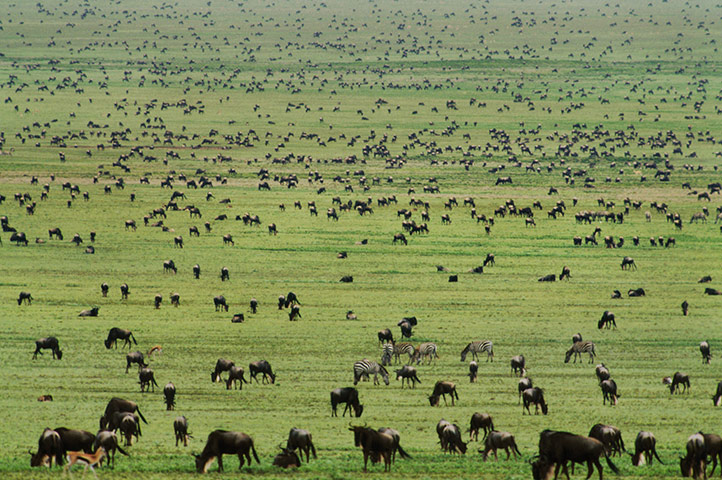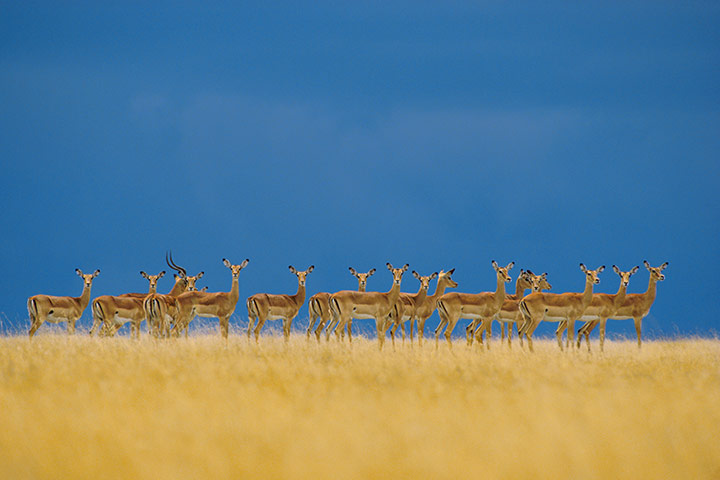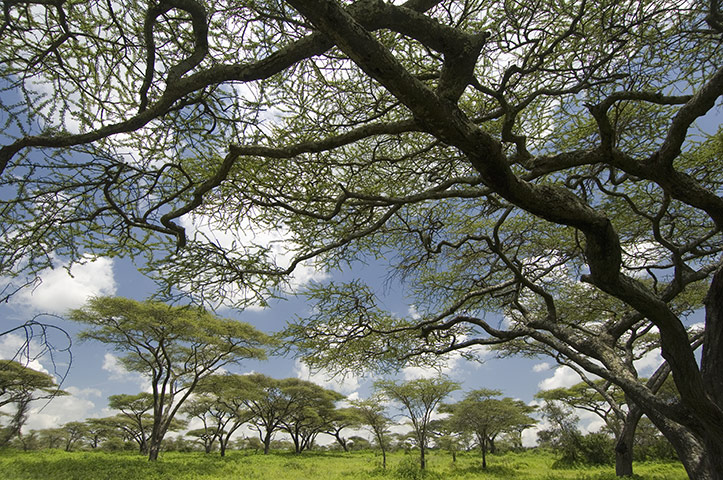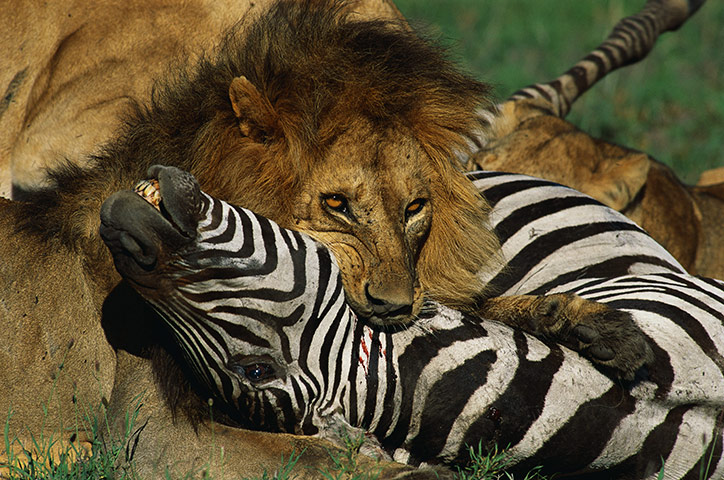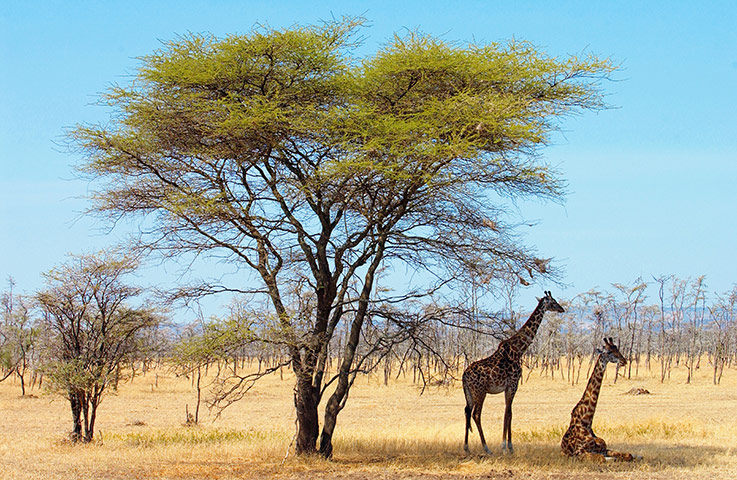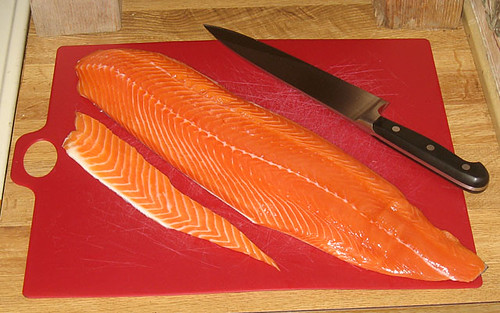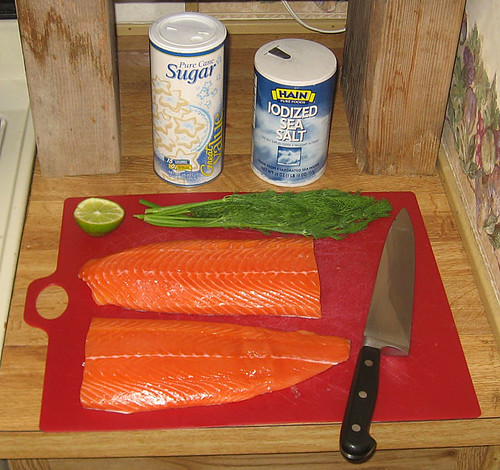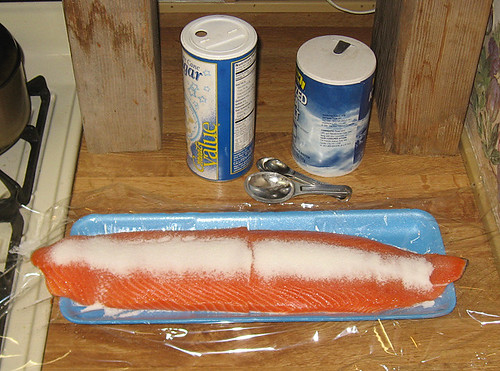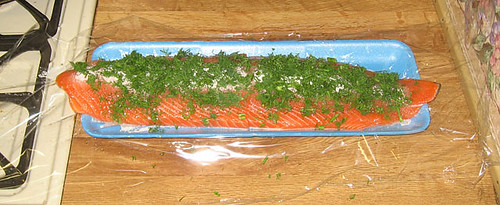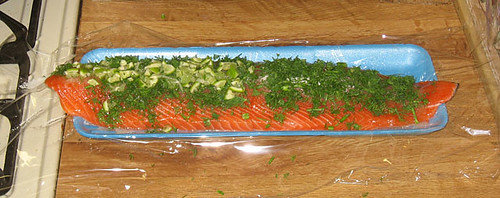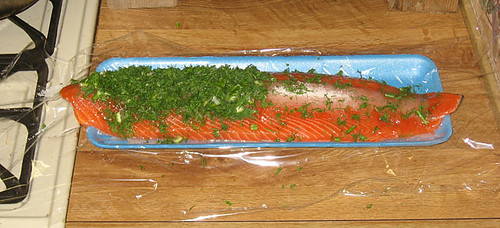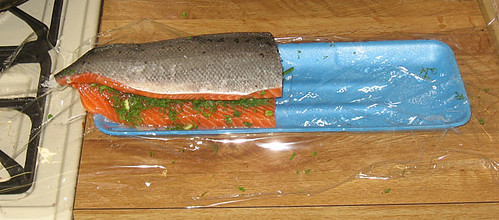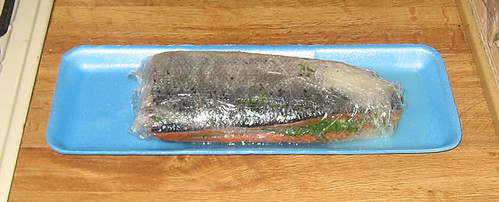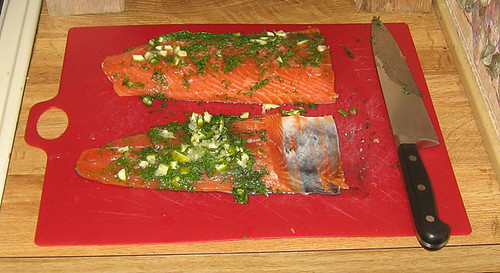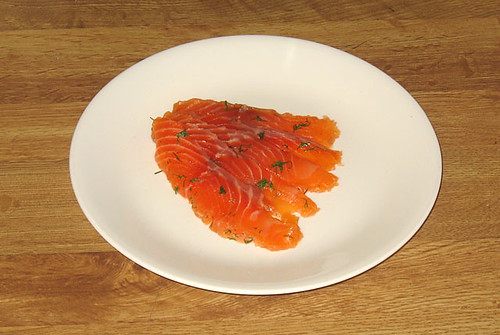In case you didn’t see my previous post, Angelo Coppola, of the excellent weekly “Latest In Paleo” podcast, has just put up Episode 12 of his podcast, featuring…me! Click here for the show.
The Last Of Wild Africa
Most of us in the West think of Africa as one big National Geographic special, full of leaping gazelles, lumbering elephants, wallowing hippos, roaring lions, stalking leopards, and a few picturesque tribesmen with spears.

The red part is desert, and the orange part is the arid Sahel. And there are 800 million people in the regions south of it.
No. Much of Africa is the Sahara desert, and Sub-Saharan Africa—the part we see on television—has a population of 800 million people, growing at 2.3 percent a year, and projected to grow to 1.5 billion by 2050.
Just like everywhere else, significant wildlife only survives in the few remaining protected areas, and is slowly dying outside it due to population pressure: poaching and habitat loss.
To give you an idea of how little is left, consider this: you could put every lion, every cheetah, every wild dog, AND every spotted hyena in the world in the average football stadium—
—and they’d each have their own seat.
That’s about 23,000 lions, 7,000 cheetahs, 4,000 African wild dogs, and 37,000 hyenas. Yes, the entire living population of the iconic African predators is less than the population of one medium-sized town, and falling.
800,000,000 humans and growing, versus perhaps 70,000 other predators—and less every year. Wildlife simply cannot survive outside protected areas in the long run…and even there, poachers kill as much as they can get away with.
What Are Humans For, Anyway?
The African savanna is what shaped us from little rainforest-dwelling monkeys into Homo sapiens. It is our hands and our brains, our blood and our bones. Everything humans are today is because of the millions of years we spent on the African savanna, which we only left perhaps 60,000 years ago…a blink in evolutionary time.
That is why we find the African savanna so beautiful and so compelling—because surviving on the savanna is, quite literally, what humans are for. Everything we’ve done since then is just a hack, a repurposing of that basic machinery, and we cannot understand anything about ourselves or our problems until we understand, accept, and embrace this reality.
The African savanna made us human—
—and that is why we must save the few scraps that remain.
The Serengeti, The Maasai Mara, and The Great Migration
The Serengeti is in Tanzania, and the Maasai Mara is in Kenya. These are human political divisions: for the millions of wildebeest that live there, they are stops on the Great Migration.
Wildebeest are grazing antelope that run in huge herds, their numbers inconceivable to anyone who hasn’t seen them. They migrate because they follow the short and the long rains, the seasonal precipitation that brings life to the African plains.
It is the last great migration, the last unfragmented savanna ecosystem, the last place that speaks to our blood and bones: This is where we came from. This land of thorny trees and baking sun and torrential rain, this land of fearsome predators and dangerous prey, of blood and fear and grass and sunlight and everything else that made us human.
And the Tanzanian government will destroy it—unless we stop them.
The Trans-Serengeti Highway
Those words mean exactly what you think they mean: a major road for truck transport, running straight across the Serengeti.
The Tanzanian government claims “it only goes across a little bit of the north part.” What they won’t tell you is: that’s the part that connects to the Maasai Mara. The highway will cut the Great Migration in half, straight across the middle.

The proposed road (red) would cut off the wildebeests' wet-season range (in the south) from their dry-season range (in the north). The proposed southern route (in purple) bypasses the park and connects to already-existing roads.
Hundreds of trucks a day, straight through the center of the largest wildlife refuge in Africa.
No migratory path survives a major road. Banff National Park in Canada has been greatly degraded by the Trans-Canada Highway, and its wildlife lives at a fraction of the density of the Great Migration. Hundreds of thousands of wildebeest will die because they can no longer follow the rains—and so will the animals that depend on them. And poachers will have a highway straight through the center of the richest ecosystem in Tanzania.
This is not hyperbole. The Serengeti will no longer qualify as a World Heritage Site if the highway is built, and tourism revenue will collapse along with the migration. Yet the president of Tanzania, Jakaya Kikwete, insists that the highway must be built, it will be built, and nothing can stop him from building it. They have already placed the survey markers, and plan to start construction in 2012.
“The proposed road could lead to the collapse of the largest remaining migratory system on Earth – a system that drives Tanzania’s tourism trade and supports thousands of people,” conclude the authors. [From a report published in the journal Nature] –“Serengeti wildebeest spectacle under threat from development”, The Guardian
“Calculations from the Frankfurt Zoological Society suggest if the wildebeest population were cut off from dry season areas, it would shrink to less than a quarter of its current size. This would likely be the end of the great migration.”
This is a tiny fraction of what we will lose. (Pictures from this photo gallery.)
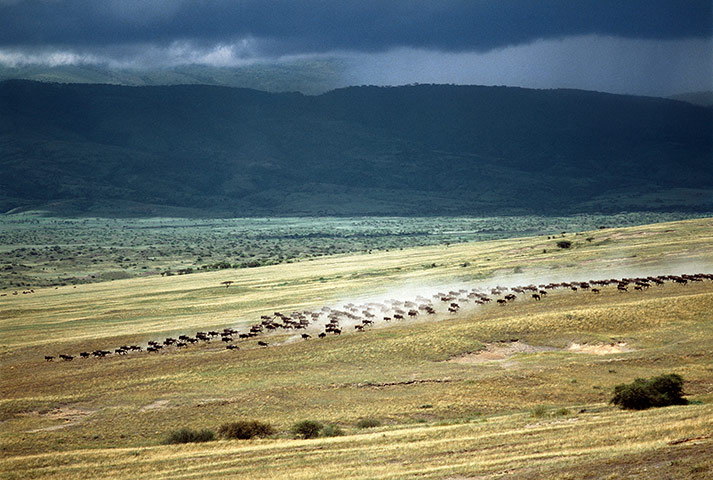
So why would the Tanzanian government sacrifice $1.5 billion dollars in tourism revenue for far less mining revenue?
Most likely because much of the tourism revenue goes to the people of Tanzania—while mining concessions go straight into the pockets of government officials.
An Open Letter To The People of Tanzania
Your founder, Mwalimu Julius Kambarage Nyerere, gave you a great gift by preserving the Serengeti. Over a billion US dollars comes to your country every year—clutched in the hands of people from all over the world who work for months or years just so they can see, for a week or two, what you have so wisely preserved.
Each year the world becomes faster and noisier, each year cities grow larger and more crowded—and each year your founder’s gift to you grows more valuable.
You are told by your leaders that the Serengeti highway is for you, for medicine and doctors and trade between villages. Yet your leaders refuse the southern route—the road that would connect so many more of your villages and bring more of you these things. They refuse it even though Germany and the World Bank have offered to help you build the southern route, and to build roads to the villages on the northern route. This is truth.
They refuse it because the road is not for you. It is for them.
The road is for big foreign companies who will come to Tanzania. They will mine soda ash from Lake Natron. They will mine uranium and rare earth minerals from around Lake Victoria. These companies will pay your leaders many millions of dollars for this. A few of you will get dirty, dangerous mining jobs for very little money, for however long the mines last…
…and the road will destroy the tourism industry that gives you over a billion US dollars a year, and 1 of every 16 jobs in your country, simply for keeping the gift of your founder safe.
They tell you it will only cross the north of the Serengeti—but that is where it connects to the Maasai Mara in Kenya. The wildebeest must follow the rains or they will die. And if they cannot, if there is no longer a Great Migration, then the tourists will not come either.
Then someday the mining companies will leave, having taken all they wanted from your country, and most likely leaving poison and destruction behind as they have in the Niger Delta. Your leaders will be rich—but all of you will be poor, even poorer than before, because you will not have your land or your jobs or the tourists or the Serengeti.
“”We lost our nets, huts and fishing pots,” said Chief Promise, village leader of Otuegwe and our guide. “This is where we fished and farmed. We have lost our forest.”
“There are more than 300 spills, major and minor, a year,” said Bassey. “It happens all the year round. The whole environment is devastated.” –“Nigeria’s agony dwarfs the Gulf oil spill”, The Guardian“I can say this,” Osuoka said firmly. “Nigeria was a much better place without oil.” –“Curse of the Black Gold”, National Geographic
This is an old, old story. It has happened many times before, everywhere from the banana republics of Central America to the rape of what is now the DRC by the Belgians—and it will happen again. It is happening right now to us, yes, even to the ‘rich’ people in the United States. Big corporations push whole mountains into the river in order to get the coal out. Others pump poison into the ground in order to force out natural gas. It’s called ‘fracking’. In some places you can light the water on fire with a match.
We are not better than you. We have seen and lived this story before, and we hope you can learn from our mistakes. The few places we have preserved—from the majesty of Yellowstone and Yosemite and Canyonlands, which people come from all over the world to see, down to the smallest city park—give us so much more than the places we’ve sacrificed in the name of ‘progress’. They grow more valuable every year.
And they are nothing compared to the Serengeti.
Connect your land and your villages with the southern route. If there must be mining and development, let it benefit you, the people of Tanzania…not just its leaders. But do not let your leaders squander the great gift your founder gave you: by enriching themselves they will only make you poorer.
Save yourselves. Save the Serengeti.
Stop the northern route, and tell them the southern route must be built instead.
Live in freedom, live in beauty.
J. Stanton
PS: I am not alone in this. Here is a letter from one of your countrymen. And in case you do not believe me when I say that mining is not the route to prosperity:
NATURAL RESOURCE ABUNDANCE AND ECONOMIC GROWTH
Jeffrey D. Sachs and Andrew M. Warner
Center for International Development and Harvard Institute for International Development“Economies with a high ratio of natural resource exports to GDP in 1970 (the base year) tended to grow slowly during the subsequent 20-year period 1970-1990. This negative relationship holds true even after controlling for many variables found to be important for economic growth by previous authors.”
In other words: the more money you get from mining and the less you get from tourism, the less Tanzania will grow. Tourism brings the wealth of the world into Tanzania: mining digs up Tanzania’s wealth and sends it away.
What You Can Do If You’re Not Tanzanian
- Join the “Stop The Serengeti Highway” Facebook page to keep up with the latest developments and online petitions.
- Join the Serengeti Watch mailing list.
- Write an actual paper letter to the Tanzanian government. Emails are generally ignored. Here is a sample letter, and a list of embassy addresses so you don’t have to air-mail it to Tanzania.
- UPDATE 6/2012: We raised $400 for the WCST through our fundraiser below, and we thank all of our generous donors for their participation. A full accounting can be found here. Our fight continues: though the road has still not been built (construction was originally schedule to begin in January 2012), the Tanzanian government still claims it must be built. At this time, those interested in helping should donate to Serengeti Watch’s Legal Defense Fund.
My publisher and I are giving to the Wildlife Conservation Society of Tanzania for every copy of The Gnoll Credo you buy directly from them. We are matching small donations and giving away books for larger donations—and all copies are signed.
Your money goes directly to Tanzanians working to preserve Tanzania, and your money goes a long way in Tanzanian shillings. Go to 100 Watt Press to learn more, and to help. - Or donate to Serengeti Watch’s Legal Defense Fund, if you like. This isn’t about my novel, it’s about saving the Serengeti.
- Publicize this effort on your own website, send this article to your friends, post it on your favorite message boards. (You can share it on Facebook, reddit, StumbleUpon, etc. with the buttons below…and here’s the shortlink.)
I know many other paleo bloggers read my articles: you can link here, or to Serengeti Watch, or the Facebook page, or wherever makes sense to you. But please help get the word out, because the place from where we get all the beautiful photos in our banners—the place that made us human—will be destroyed forever if we do nothing.
Live in freedom, live in beauty.
JS
